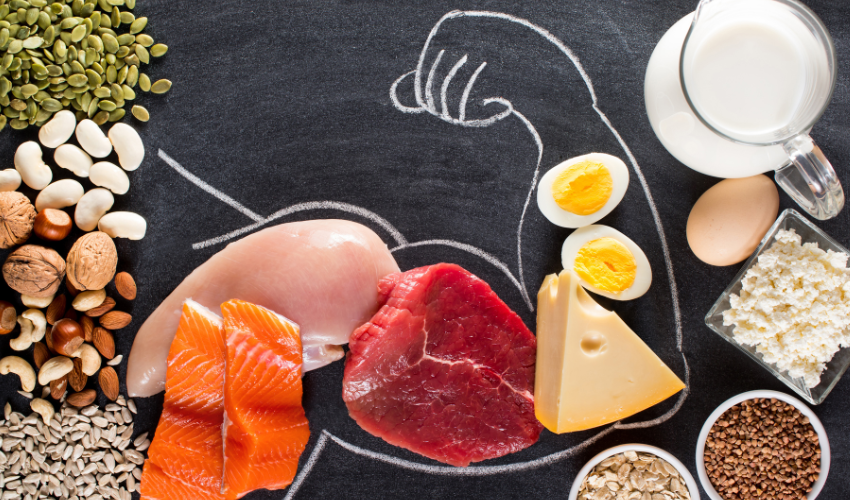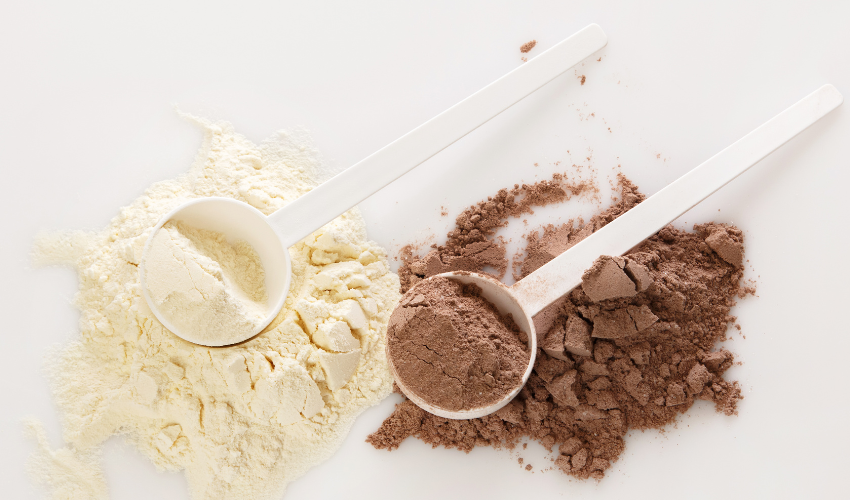Building muscle is a complex process that requires dedication, hard work, and the right nutrition. While many people may assume that lifting weights is the only way to build muscle, the truth is that nutrition plays a vital role in this process. In particular, protein is a critical nutrient that helps to build and repair muscle tissue. In this article, we’ll explore how protein builds muscle and provide you with the information you need to create a nutrition plan that supports your muscle-building goals.
The Importance of Protein for Muscle Building
Protein is an essential macronutrient that is necessary for a variety of functions in the body, including muscle growth and repair. When you lift weights or engage in other forms of resistance training, you create tiny tears in your muscle fibers. These tears need to be repaired in order for your muscles to grow and become stronger. Protein provides the amino acids that your body needs to repair and rebuild muscle tissue, making it a crucial component of any muscle-building nutrition plan.
How Protein Builds Muscle
When you consume protein, it is broken down into its component amino acids in the digestive system. These amino acids are then transported to your muscles, where they are used to repair and rebuild muscle tissue. In particular, there are three amino acids that are especially important for muscle growth: leucine, isoleucine, and valine. These amino acids are known as branched-chain amino acids (BCAAs), and they are particularly effective at stimulating muscle growth.
How Much Protein Do You Need?
The amount of protein that you need to consume in order to build muscle depends on a variety of factors, including your body weight, activity level, and goals. As a general rule, it’s recommended that you consume at least 1 gram of protein per pound of body weight per day if you’re looking to build muscle. For example, if you weigh 150 pounds, you should aim to consume at least 150 grams of protein per day.
When Should You Consume Protein?
Timing is also an important factor when it comes to protein consumption and muscle building. To optimize muscle growth, it’s recommended that you consume protein both before and after your workouts. This can help to provide your muscles with the amino acids they need to repair and rebuild muscle tissue, as well as to prevent muscle breakdown.
Best Protein Sources for Muscle Building

Not all protein sources are created equal when it comes to muscle building. While it’s possible to get protein from a variety of sources, some sources are more effective at stimulating muscle growth than others. Some of the best protein sources for muscle building include:
- Lean meats, such as chicken, turkey, and beef
- Fish, such as salmon and tuna
- Eggs
- Dairy products, such as milk, yogurt, and cheese
- Plant-based protein sources, such as beans, lentils, and tofu
Protein Supplements for Muscle Building
While it’s possible to get all the protein you need from food sources, many people choose to supplement their diets with protein powders or shakes. These supplements are a convenient way to increase your protein intake, especially if you have a busy schedule or don’t have access to high-quality protein sources. Some of the most popular protein supplements for muscle building include whey protein, casein protein, and plant-based protein powders.
FAQs
Can you build muscle without consuming protein?
While it’s possible to build muscle without consuming protein, it’s much more difficult to do so. Protein provides the essential amino acids that your body needs to repair and rebuild muscle tissue. Without enough protein, your body won’t have the necessary building blocks to build new muscle, and you may not see the same results from your workouts.
Can you consume too much protein?
Yes, it is possible to consume too much protein. Excess protein can be converted into glucose in the body, which can lead to weight gain and other health issues. Additionally, consuming very high levels of protein over a long period of time can put stress on the kidneys and other organs. It’s important to consume protein in moderation and to balance your protein intake with other macronutrients, such as carbohydrates and fats.
What is the best time to consume protein for muscle building?
It’s recommended that you consume protein both before and after your workouts in order to optimize muscle growth. Consuming protein before your workout can provide your muscles with the energy they need to perform at their best, while consuming protein after your workout can help to repair and rebuild muscle tissue.
How long does it take to build muscle with protein?
Building muscle is a slow and gradual process that takes time and dedication. While some people may see results within a few weeks of starting a muscle-building program, most people will need several months or more to see significant changes. The speed of muscle growth also depends on factors such as age, gender, genetics, and overall health.
Can plant-based sources of protein be just as effective for muscle building as animal-based sources?
Yes, plant-based sources of protein can be just as effective for muscle building as animal-based sources. While animal-based sources of protein are often considered to be the most effective for muscle growth, plant-based sources of protein can provide all the essential amino acids that your body needs to build muscle. Some plant-based protein sources, such as soy and pea protein, are also high in BCAAs and can be just as effective as animal-based sources.
Conclusion
In conclusion, protein plays a critical role in building and repairing muscle tissue. Whether you’re looking to build lean muscle mass, increase strength, or improve your overall fitness, consuming enough protein is essential for achieving your goals. By incorporating high-quality protein sources into your diet and timing your protein consumption around your workouts, you can optimize muscle growth and achieve the physique you’ve always wanted.























